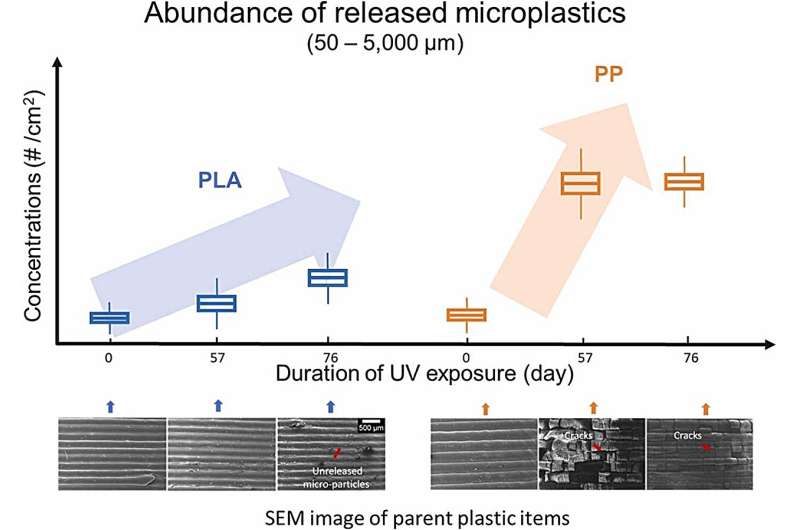This article has been reviewed according to Science X's editorial process and policies. Editors have highlighted the following attributes while ensuring the content's credibility:
fact-checked
trusted source
proofread
Plant-based plastic releases nine times less microplastics than conventional plastic

A newly developed plant-based plastic material releases nine times less microplastics than conventional plastic when exposed to sunlight and seawater, a new study has found.
The research, led by experts from the University of Portsmouth and the Flanders Marine Institute (VLIZ), in Belgium, looked at how two different types of plastic break down when tested in extreme conditions. The findings are published in the journal Ecotoxicology and Environmental Safety.
A bio-based plastic material made from natural feedstocks held up better when exposed to intense UV light and seawater for 76 days—the equivalent of 24 months of sun exposure in central Europe—than a conventional plastic made from petroleum derivatives.
Professor of Mechanical Engineering, Hom Dhakal, from the University's School of Mechanical and Design Engineering, and member of Revolution Plastics said, "Bio-based plastics are gaining interest as alternatives to conventional plastics, but little is known about their potential source of microplastics pollution in the marine environment.
"It's important to understand how these materials behave when they're exposed to extreme environments, so we can predict how they'll work when they're used in marine applications, like building a boat hull, and what impact they might have on ocean life.
"By knowing the effect of different types of plastics on the environment, we can make better choices to protect our oceans."
According to the Plastic Oceans International Organization, the equivalent of a truckload of plastic is poured into the oceans every minute of the day. When this plastic waste is exposed to the environment, it breaks down into smaller particles which are less than 5mm in size.
These particles are known as "microplastics" and have been observed in most marine ecosystems, posing a serious threat to aquatic life.
"We wanted to look at a conventional industrial polymer, polypropylene, which is non-biodegradable and difficult to recycle, against polylactic acid (PLA), a biodegradable polymer," Professor Dhakal explained.
"Although our findings show that the PLA released less microplastics, which means using plant-based plastics instead of oil-based ones might seem like a good idea to reduce plastic pollution in the ocean, we need to be careful as microplastics are still clearly being released and that remains a concern."
The research also found that the size and shape of the tiny plastic pieces released depended on the type of plastic. The conventional plastic released smaller pieces and had fewer fiber-like shapes compared to the plant-based plastic.
Professor Dhakal added, "Overall our research provides valuable insights into the behavior of different plastic types under environmental stressors, which is important for our future work to tackle plastic pollution.
"There is a clear need for continued research and proactive measures to mitigate the impact of microplastics on marine ecosystems."
Professor Dhakal is a member of the Revolution Plastics initiative that has been instrumental in informing national and global policies on plastics, pioneering advanced enzyme recycling techniques and contributing to critical discussions on the UN treaty to end plastic pollution.
Revolution Plastics operates as a network of interconnected researchers and innovators across the University, consolidating and expanding a world-leading plastic-focused research, innovation and teaching community.
More information: Zhiyue Niu et al, Accelerated fragmentation of two thermoplastics (polylactic acid and polypropylene) into microplastics after UV radiation and seawater immersion, Ecotoxicology and Environmental Safety (2024). DOI: 10.1016/j.ecoenv.2024.115981
Provided by University of Portsmouth





















